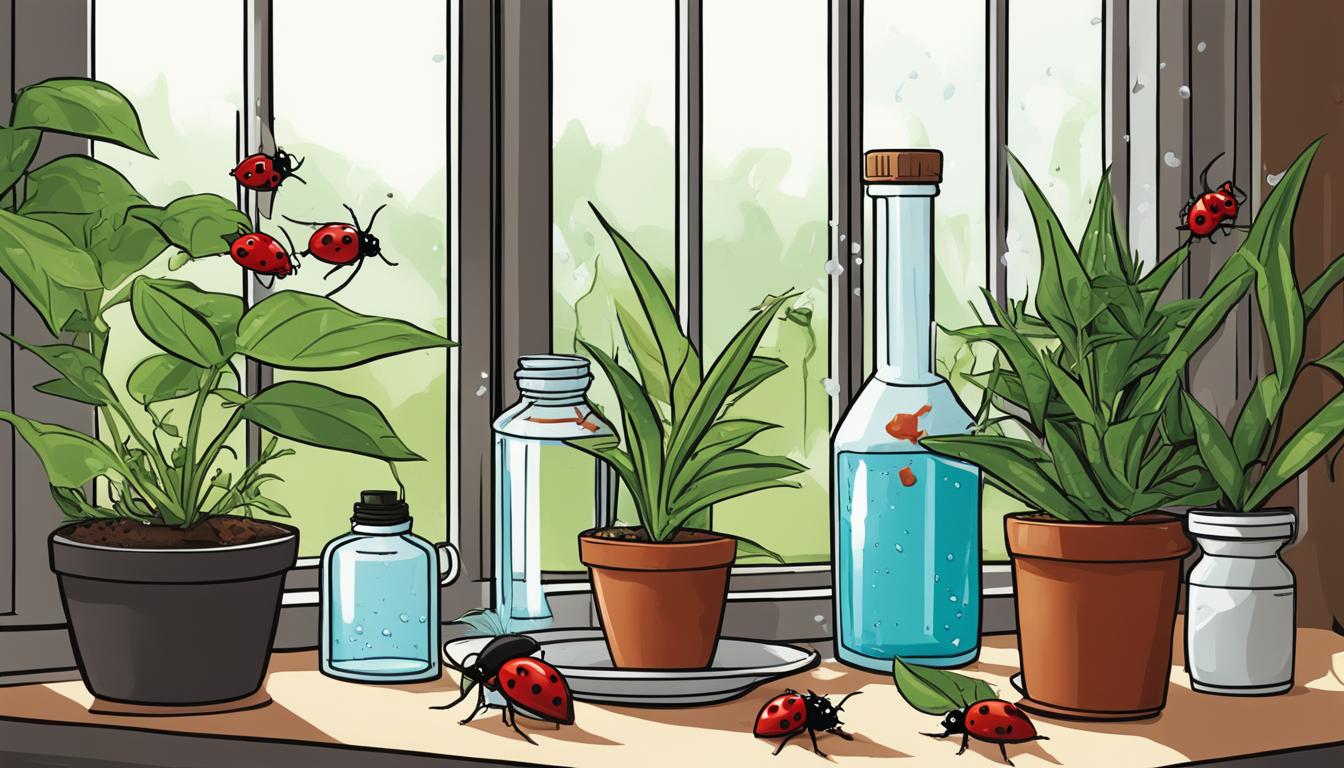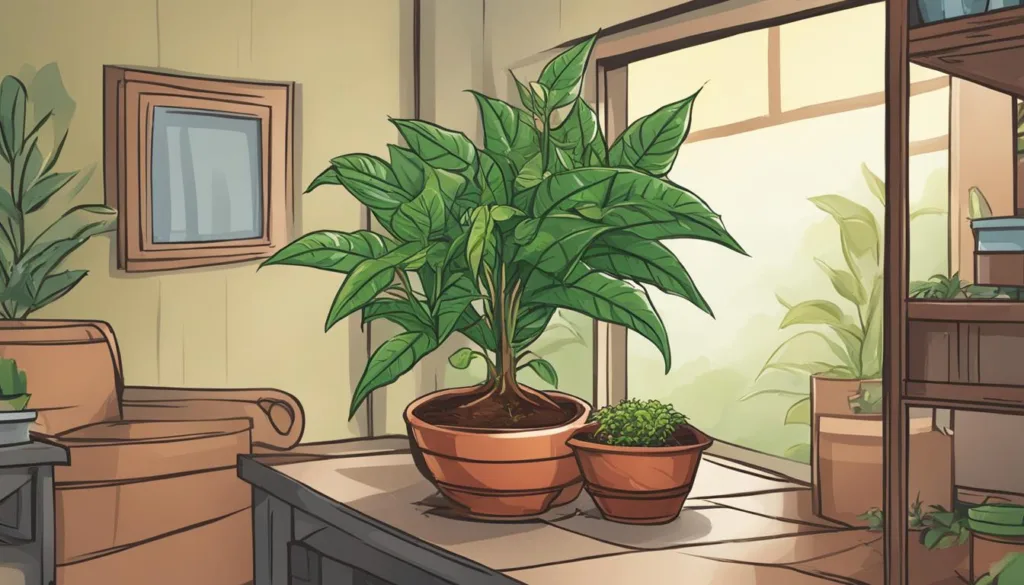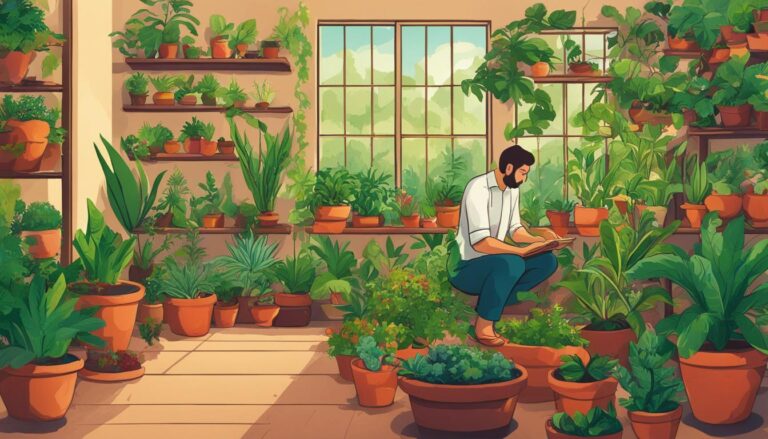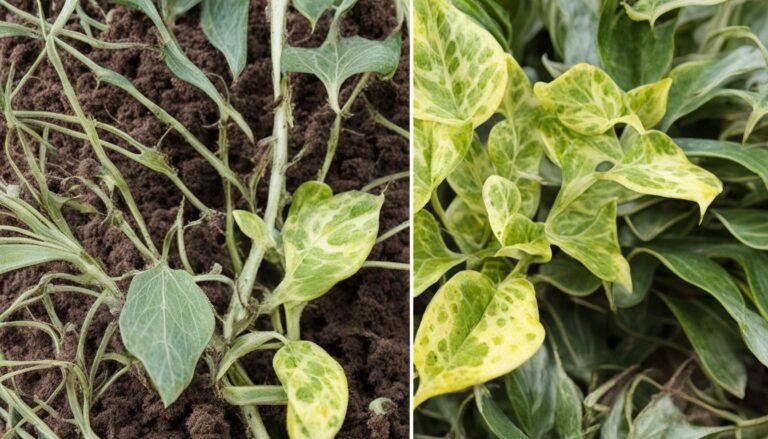
When it comes to indoor plant pest control, opting for organic methods is not only better for our health but also for the well-being of our plants.
Unlike synthetic chemical pesticides, natural remedies are safer, more cost-effective, and often more effective against certain pests. If you’re looking for ways to eliminate indoor plant pests naturally, there are several organic methods you can try.
One effective approach is using homemade bug sprays made with mild liquid soap or organic insecticidal soap. These sprays can be applied directly to the leaves of infested plants or used to create barriers against pests.
Another natural option is neem oil, a pesticide derived from the neem tree. It is particularly effective against common plant pests like aphids, scale, mealybugs, and spider mites. Also, using gnat barriers, diatomaceous earth, and yellow sticky traps can help control and eliminate indoor plant pests.
Key Takeaways:
- Organic methods provide a safer and more effective alternative for indoor plant pest control.
- Homemade bug sprays made with mild liquid soap or organic insecticidal soap can be used to eliminate pests.
- Neem oil is a highly effective natural pesticide for indoor plants, providing long-lasting protection.
- Gnat barriers, diatomaceous earth, and yellow sticky traps are useful in controlling indoor plant pests.
- Regular inspection and care for indoor plants can help prevent pest infestations.
Why Use Natural Pest Control for Indoor Plants?
Using natural pest control methods for indoor plants offers several benefits. Firstly, it eliminates the need for toxic chemical pesticides, making it safer for us, our families, and our pets.
Synthetic chemical pesticides can have harmful effects on our health, and their residues can linger on our plants and in our homes. By opting for natural pest control, we can create a healthier environment for ourselves and our indoor gardens.
Another advantage of using natural methods is cost-effectiveness. Synthetic chemical pesticides can be expensive, especially for long-term use.
On the other hand, many natural remedies can be easily made at home using common household ingredients. This not only saves money but also ensures that we have a sustainable and readily available solution for indoor plant pest control.
Additionally, natural pest control methods are more sustainable in the long run. Many common houseplant pests can develop resistance to synthetic chemical pesticides over time, rendering them ineffective.
By using natural methods, we can avoid this issue and maintain a pest-free indoor garden without relying on harsh chemicals. Furthermore, natural pest control promotes biodiversity by protecting beneficial insects and organisms that help maintain a balanced ecosystem.
In conclusion, the advantages of using natural pest control for indoor plants are abundant. From the health benefits for ourselves and our pets to the cost-effectiveness and long-term sustainability, natural pest control methods offer a safe and effective solution for eliminating indoor plant pests.
By adopting these organic pest management practices, we can enjoy a thriving and pest-free indoor garden that brings beauty and enjoyment to our homes.
Homemade Bug Sprays: An Effective Natural Pest Control Method
When it comes to combating indoor plant pests, homemade bug sprays are a highly effective natural pest control method. These DIY sprays can be easily made using ingredients you likely already have in your home, making them a convenient and affordable solution. Not only are they effective at eliminating pests, but they are also safe to use on most indoor plants.
To create your own homemade bug spray, simply mix mild liquid soap with water in a spray bottle. The soap acts as a natural insecticide, killing bugs on contact. You can spray this mixture directly onto infested plants or use it to wash the leaves of heavily affected plants.
Alternatively, you can opt for organic insecticidal soap, which is specifically designed to control pests on houseplants.
Using soap and water as a natural pest control method offers several advantages. Firstly, it eliminates the need for harsh chemical pesticides that can be harmful to both humans and plants. Additionally, it provides an eco-friendly alternative that is safe for the environment.
By incorporating homemade bug sprays into your indoor plant care routine, you can effectively eliminate pests and maintain a healthy, pest-free garden.
Benefits of Homemade Bug Sprays:
- Cost-effective and easy to make
- Safe for most indoor plants
- Eliminates the need for harsh chemical pesticides
- Environmentally friendly
| Bug Spray Recipe | Ingredients | Instructions |
|---|---|---|
| Mild Liquid Soap Spray | 2 tablespoons mild liquid soap 1 quart water | 1. Mix the soap and water in a spray bottle. 2. Shake well to combine. 3. Spray directly on infested plants or wash leaves with the mixture. |
| Organic Insecticidal Soap | Organic insecticidal soap (as per product instructions) | 1. Follow the product instructions for dilution. 2. Spray directly on infested plants. |
Neem Oil: A Natural Pesticide for Indoor Plants
When it comes to controlling indoor plant pests, neem oil is a valuable natural solution. Derived from the neem tree, this oil is known for its effective pest control properties. It offers several benefits when used to eliminate pests in your indoor garden.
One of the major advantages of neem oil is its broad-spectrum effectiveness. It can control and eliminate common houseplant pests such as aphids, scale, mealybugs, and spider mites. This makes it a versatile option for tackling various pest infestations.
Not only does neem oil provide immediate results by killing pests on contact, but it also has a residual effect. Unlike some other methods, you don’t have to treat your plants every day. Neem oil provides long-lasting protection against pests, reducing the need for frequent applications.
How to Use Neem Oil for Indoor Plant Pest Control
Using neem oil is relatively straightforward. Dilute the oil according to the instructions on the packaging, and then apply it to your plants using a spray bottle or a cloth. Be sure to cover both the top and bottom sides of the leaves, as pests often hide on the undersides.
It’s important to note that neem oil may leave a residue on your plants, giving them a shiny appearance. This is normal and doesn’t harm the plants. However, it’s advisable to test the oil on a small area of the plant before applying it fully to ensure your plant doesn’t have any adverse reactions.
By using neem oil as a natural insecticide, you can effectively control pests in your indoor garden while avoiding the use of synthetic chemical pesticides. With its broad-spectrum effectiveness and residual protection, neem oil is a valuable tool in maintaining a pest-free environment for your houseplants.

Natural Methods for Soil Pest Control in Indoor Plants
Bugs that infest houseplant soil can be a nuisance and pose a threat to the health of your indoor plants. Fortunately, there are effective natural methods you can use to remove these pests and maintain a healthy indoor garden. By implementing these techniques, you can ensure that your plants thrive without the need for harmful chemicals.
Hydrogen Peroxide Solution
One natural solution for soil pest control is using a hydrogen peroxide solution. Mix one part hydrogen peroxide with three parts water and pour it into the soil. This solution helps kill bacteria, fungi, viruses, and pests that may be hiding in the soil. It is important to let the solution sit in the soil for a few minutes before watering the plant again.
Diatomaceous Earth as a Soil Cover
Another effective method is using diatomaceous earth as a natural soil cover. Diatomaceous earth is a powder made from fossilized algae that works by lacerating and drying out bugs.
Simply sprinkle a thin layer of diatomaceous earth on top of the soil and gently work it into the top layer. This acts as a barrier against pests and helps keep your plants free from infestations.
Allowing Soil to Dry Out
Another simple yet effective approach is to allow the soil to dry out between waterings. Many pests thrive in moist environments, so by allowing the soil to dry out completely, you can eliminate their breeding grounds. However, it is important to monitor your plants and ensure they do not become excessively dry, as this can harm the plant itself.
By using these natural methods for soil pest control, you can effectively remove bugs from your houseplant soil and create a healthy environment for your indoor garden to flourish.
| Method | Effectiveness | Ease of Use | Cost |
|---|---|---|---|
| Hydrogen Peroxide Solution | High | Easy | Affordable |
| Diatomaceous Earth | Medium | Easy | Inexpensive |
| Allowing Soil to Dry Out | Medium | Easy | Free |
Prevention and Maintenance for a Pest-Free Indoor Garden
To maintain a pest-free indoor garden, preventing infestations is crucial. One effective preventative measure is using neem oil. Neem oil acts as a natural repellent and disrupts the life cycle of many pests, deterring them from infesting your plants. Dilute the neem oil according to the instructions and apply it to your plants regularly to create a protective barrier.
In addition to neem oil, regular inspection and care for your indoor plants are essential. Take the time to examine your plants thoroughly, checking for any signs of pests such as discolored leaves, sticky residue, or small webs.
Early detection allows for prompt action and prevents the spread of infestations. Moreover, maintaining optimal plant health through proper watering, pruning, and providing adequate sunlight helps to ward off pests, as healthy plants are more resistant to infestations.
Another preventive measure is isolating infested plants. If you notice signs of pests on a particular plant, separate it from the rest of your indoor garden immediately.
By doing so, you prevent the pests from spreading to other plants, containing the infestation and minimizing damage. Keep the isolated plant under close observation and treat it accordingly to eradicate the pests and restore its health.
Prevention and regular maintenance are vital for a pest-free indoor garden. Utilizing neem oil, conducting regular inspections, and practicing good plant care are key to avoiding infestations. By following these practices, you can enjoy a thriving indoor garden free from pesky plant pests.
FAQ
What are some organic methods for indoor plant pest control?
Some organic methods for indoor plant pest control include using homemade bug sprays with mild liquid soap, organic insecticidal soap, rubbing alcohol, neem oil, gnat barriers, diatomaceous earth, and yellow sticky traps.
Why is using natural pest control important for indoor plants?
Using natural pest control for indoor plants is important because it eliminates the need for toxic chemical pesticides, making it safer for us, our families, and our pets. It is also more cost-effective and can prevent pests from building resistance to synthetic pesticides over time.
How can I make a homemade bug spray for indoor plants?
You can make a homemade bug spray for indoor plants by mixing mild liquid soap with water. This mixture can be used in a spray bottle or to wash the leaves of heavily infested plants. Organic insecticidal soap is another option that works as a natural insecticide for houseplants.
How can I use neem oil to eliminate indoor plant pests?
Neem oil can be used to control and eliminate common houseplant pests such as aphids, scale, mealybugs, and spider mites. It can be applied directly to the leaves and stems of infested plants and has a residual effect, providing long-lasting protection against pests.
What natural methods can I use for soil pest control in indoor plants?
To control soil pests in indoor plants, you can use a hydrogen peroxide solution, which kills bacteria, fungi, viruses, and pests in the soil. Diatomaceous earth, a finely ground powder made from fossilized algae, can be used as a soil cover to lacerate and dry out bugs. Allowing the soil to dry out after flushing out bugs is also recommended.
How can I prevent and maintain a pest-free indoor garden?
To prevent pest infestations in your indoor garden, consider isolating infested plants, using neem oil as a preventative measure, and regularly inspecting plants for signs of infestation. Proper care, such as providing the right amount of water and sunlight, can also promote healthy plant growth and deter pests.







One Comment
Comments are closed.